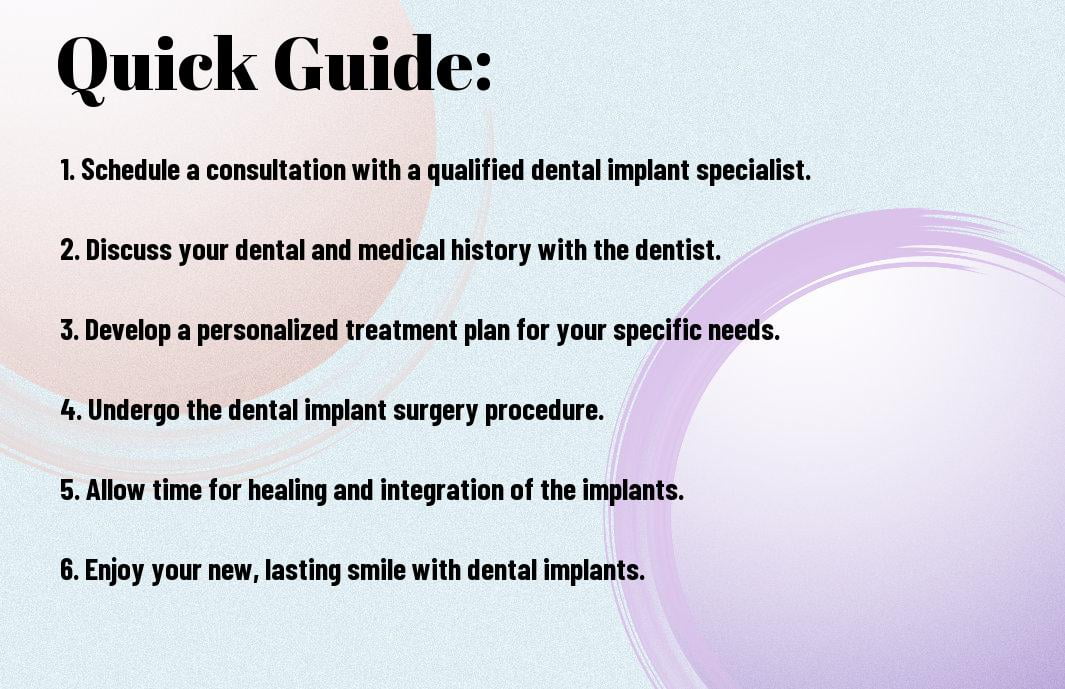Over recent years, dental implants have become the go-to solution for those looking to restore their smiles and improve their overall oral health. This comprehensive guide will walk you through everything you need to know about dental implants, from the benefits and potential risks to the procedures involved and aftercare requirements. Whether you are missing a single tooth or in need of a full mouth restoration, dental implants offer a long-lasting and natural-looking solution that can significantly enhance your quality of life. By understanding the ins and outs of this innovative dental treatment, you can make an informed decision about whether dental implants are the right choice for you.
Key Takeaways:
- Dental implants are a long-lasting solution: Dental implants provide a permanent option for replacing missing teeth, offering a stable and natural-looking smile.
- Proper oral care is necessary: Maintaining good oral hygiene practices is crucial for the success of dental implants, preventing complications such as infection and implant failure.
- Consultation with a qualified professional is important: Working with a skilled and experienced dentist is vital for the success of your dental implant procedure, ensuring proper evaluation, treatment planning, and post-operative care.
Understanding Dental Implants
What Are Dental Implants?
A dental implant is a permanent solution to replace missing teeth by surgically placing artificial tooth roots into the jawbone. These titanium posts act as a sturdy foundation for replacement teeth, such as crowns or dentures, offering stability and durability similar to natural teeth.
History and Development of Dental Implants
Implants are not a modern invention; their history dates back to ancient civilizations that experimented with different materials to replace teeth. However, it was in the 1950s when Dr. Per-Ingvar Brånemark accidentally discovered osseointegration, the process where bone fuses with titanium, laying the foundation for modern dental implants. Since then, advancements in technology and techniques have made dental implants one of the most reliable and effective tooth replacement options available today.
Types of Dental Implants
Any individual considering dental implants should be well-informed about the different types that are available. Recognizing the various options will help you make a more informed decision about which type of implant is best suited for your specific needs. Below is a breakdown of the main types of dental implants:
| Endosteal Implants | Subperiosteal Implants |
| Mini and Micro Implants | All-on-4 Treatment Concept |
Endosteal Implants
Implants are surgically placed into the jawbone in this type of procedure. These implants are typically made of titanium and provide a strong foundation for artificial teeth. Endosteal implants are the most common type of dental implant and are suitable for most patients who have good oral health.
Subperiosteal Implants
With Subperiosteal implants, the implant is placed on top of the jawbone underneath the gum line. This type of implant is recommended for patients who do not have enough healthy jawbone for other types of implants. The implant sits on a metal frame that is placed below the gum tissue.
Mini and Micro Implants
Types of implants that are smaller in diameter compared to traditional implants fall under this category. Mini and micro implants are often used in cases where there is minimal bone density and are popular for supporting lower dentures or in situations where space is limited.
All-on-4 Treatment Concept
Implants are placed strategically in the jaw to support a full set of artificial teeth with the All-on-4 Treatment Concept. This innovative technique allows for the attachment of a complete arch of prosthetic teeth with just four implants. Understanding the advantages of this concept can help patients achieve a complete smile restoration in a more efficient manner.
The Pros and Cons of Dental Implants
All, Importantly pros and cons information should be broken down into
| Initial Consultation and Planning | Surgical Placement of the Implant |
Initial Consultation and Planning
The initial step in the dental implant process is the consultation with your dentist. During this appointment, your dentist will evaluate your oral health, discuss your treatment goals, and create a customized treatment plan. X-rays and impressions may be taken to help with the planning of the implant procedure.
Surgical Placement of the Implant
If you are a candidate for dental implants after the initial consultation, the next step involves the surgical placement of the implant into your jawbone. This procedure is typically performed under local anesthesia. The implant is placed carefully into the bone and left to heal and fuse with the bone over several months.
It is crucial to follow your dentist’s post-operative instructions carefully to promote proper healing and successful osseointegration of the implant.
Osseointegration and Healing
Getting dental implants involves the process of osseointegration, where the implant fuses with the surrounding bone tissue. This healing phase can take several months to ensure a strong foundation for the dental prosthesis. During this time, it is imperative to maintain good oral hygiene and attend follow-up appointments with your dentist.
Placing the Abutment and Dental Prosthesis
After the implant has integrated with the jawbone, the next step is to place the abutment, which connects the implant to the dental prosthesis. Once the abutment is placed, impressions are taken to create a custom-made crown, bridge, or denture to restore your smile. The final prosthetic is then attached to the abutment, completing your dental implant restoration.
Any discomfort during the process is typically well-managed with pain medications prescribed by your dentist. Regular check-ups are imperative to monitor the health and stability of the implant.
Post-Procedure Care Tips
After getting dental implants, it is crucial to follow proper post-procedure care tips to ensure a successful recovery and the longevity of your implants. Here are some recommendations to help you navigate through the post-implant phase:
- Maintain good oral hygiene by brushing and flossing regularly around the implant area.
- Avoid hard or sticky foods that may damage the implant.
- Attend follow-up appointments with your dentist to monitor healing progress.
- Be mindful of any signs of infection or complications and contact your dentist immediately if you have any concerns.
Recognizing the importance of proper care is necessary for the success of your dental implants. For more in-depth information, refer to The Comprehensive Guide to Dental Implants.
Immediate Aftercare Following Surgery
Clearly, immediate aftercare following dental implant surgery is crucial to promote healing and prevent complications. It is necessary to follow your dentist’s instructions meticulously, including proper oral hygiene practices and prescribed medications. Swelling and discomfort are common in the first few days, but they should gradually improve as you follow post-operative care guidelines.
Long-term Maintenance of Dental Implants
On the other hand, long-term maintenance of dental implants is necessary for their durability and success. It is crucial to schedule regular check-ups with your dentist to assess the health of your implants and overall oral health. Preventive care, such as professional cleanings and examinations, can help detect any issues early on and ensure the longevity of your implants.
Summing up
Now equipped with ‘The Comprehensive Guide to Dental Implants – Your Path to a Lasting Smile’, you have a detailed roadmap to understand and launch on the journey towards a perfect smile. Dental implants offer a long-lasting solution for missing teeth, and this guide has provided you with crucial information to make informed decisions about your dental health. By following the steps outlined in this guide, you are on your way to achieving a confident and radiant smile that can positively impact your overall well-being. Bear in mind, a lasting smile begins with proper knowledge and care, so use this guide as your tool to navigate through the world of dental implants with confidence and ease.
FAQ
Q: What are dental implants?
A: Dental implants are artificial tooth roots that are surgically placed into the jawbone to support a replacement tooth or bridge. They provide a strong foundation for fixed or removable replacement teeth that are made to match your natural teeth.
Q: Who is a candidate for dental implants?
A: The ideal candidate for dental implants is someone who is in good general and oral health, has enough bone in their jaw to support the implant, and does not have conditions that may affect the healing process after surgery. Your dentist will be able to determine if you are a suitable candidate for dental implants after a thorough evaluation of your oral health.
Q: What are the benefits of dental implants?
A: Dental implants offer numerous benefits, including improved appearance, speech, comfort, and oral health. They are a long-term solution for missing teeth that can last a lifetime with proper care. Dental implants also help preserve facial structure by preventing bone loss that occurs when teeth are missing.

Dr. Leslie Smith, DDS
Dr. Leslie Smith, DDS graduated from The University of Texas School of Dentistry at Houston in 2015. Her philosophy is simple. "Care for your patient and do dentistry on them the same way you would like it done." Dr. Smith loves writing so much that she is now the content editor of Brightest Smiles Dentist Finder. Read more about Dr. Smith
Subscribe to Our Newsletter
Never miss a single update! Subscribe now and find out the latest and best for your dental/oral health.
The educational health content on Brightest Smiles Dentist Finder is reviewed by our medical review board and team of experts to be up-to-date and in line with the latest evidence-based medical information and accepted health guidelines. The information contained on this website should not be used as a substitute for the medical care and advice of your doctors. There may be variations in treatment that your dentists or doctors may recommend based on individual facts and circumstances. Use of this site is subject to our terms of use and privacy policy.
You Might Also Be Interested In


Common Myths About Cosmetic Dentistry and Their Origins




